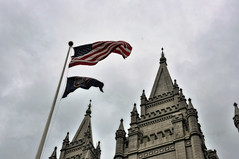
Can a person be a good Mormon and a Democrat?
It’s not an uncommon question. American Latter-day Saints, who predominantly are members of the Republican party, wonder whether their brethren on the “other side of the aisle” can be faithful followers of Christ while uniting with a political party that adheres to and advocates policies that openly conflict with the doctrine and policy positions of The Church of Jesus Christ of Latter-day Saints.
Given their minority status, it’s not unsurprising to see LDS Democrats go on the defense. They’ve organized a caucus, organize support groups and training meetings, and openly defend their claim that they, as Democrats, are still Mormons in good standing.
What’s hilarious about this situation is that it’s a historical role reversal. Mormons once heavily favored the Democrats (after all, the Republican party was explicitly founded to fight for the eradication of polygamy, which the Saints were practicing at the time). I explain the circumstances behind this political relationship in the introduction of Latter-day Liberty (read it free here), highlighting how a dissolution of the local Mormon People’s Party in Utah led to the Saints joining either the Republican or Democrat parties. Naturally, they shied away from the former. I conclude the point with this tidbit:
Church leaders went to great lengths to see that members signed up for the Republican Party. Many prominent Republican General Authorities affirmed that, contrary to popular belief, one could be both a Republican and a Latter-day Saint in good standing.
If this sounds familiar, it’s because it is—the same reassuring claims are now made in the reverse, suggesting that one can be both a Democrat and Latter-day Saint in good standing. The more things change, the more they stay the same.
The shifting tides of political parties make the underlying point more difficult to see, so here it is in all its unvarnished clarity: all political parties promote policies that are at odds with the gospel of Jesus Christ.
This is not a controversial statement. It harmonizes perfectly with what Church leaders routinely say regarding politics: “Principles compatible with the gospel may be found in the platforms of the various political parties.” The obvious semantic nitpick is that this says such principles may be found in political parties, but does not say that they are to be found there. The other and more reasonable argument to advance with respect to this statement is that each political party argues for a great number of policies. So while any given party may espouse an idea that is in harmony with the gospel (and thus find application to the qualified statement by Church authorities), the party may espouse forty other ideas that are each at odds with the gospel. There is no religious rubber stamp of divine approval for any political party. All parties promote one thing or another that are at odds with the gospel.
Which brings us to the Republican party, of which so many Latter-day Saints are members.
The Republican Party Platform contains policies that conflict with basic gospel principles. The party “is committed to saving Medicare and Medicaid” (both socialist programs operating through coercive taxation) and aims to “restore public trust in the [Social Security] system,” thereby forcing new generations to financially support the elderly or be sent to jail. Despite any constitutional authority to do so, and using the same coercive taxation (of which the Book of Mormon speaks so poorly), the Party “support[s] federal investment in healthcare delivery systems and solutions” to “provide greater, more cost-effective access to high quality healthcare.”
The GOP, known for its militaristic tendencies—especially in a post 9/11 world—aims to “create a climate for democracy” by “employ[ing] the full range of military and intelligence options” to “wield overwhelming military power.” These soft-sounding statements are backed with an arsenal of military might—false gods of stone and steel, worshipped by Republicans and many Mormons within their ranks.
No political party is free from advocacy of flagrant violations of basic gospel tenets. Mormon Republicans who question whether their fellow worshippers in the Democratic party are “good Mormons” must put an end to their pharisaical campaign and realize that their own status of “good Mormon” might similarly be in question. As the Savior taught, “He that is without sin among you, let him first cast a stone…”
So what does it mean to be a “good Mormon” anyway? Faithful church attendance? Outward checklist-able behavior such as refraining from drugs, immodesty, and the like?
Or perhaps one benchmark of a Mormon’s “goodness” is the list of temple recommend questions that determine a Latter-day Saint’s worthiness to enter what is considered a holy place. One of these questions asks the individual the following:
Do you support, affiliate with, or agree with any group or individual whose teachings or practices are contrary to or oppose those accepted by the Church of Jesus Christ of Latter-day Saints?
A direct, honest, and thoughtful answer to this question might require a Mormon of any political party to confess their affiliation and answer yes.
Continue reading at the original source →



